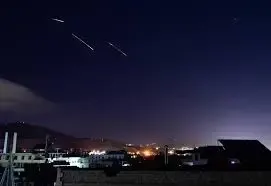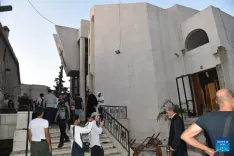Why Did Israel Conduct Airstrikes on Iran's Military Sites?

Synopsis
Key Takeaways
- Israel launched airstrikes targeting Iranian military infrastructure.
- Approximately 20 fighter jets executed the operation.
- The strikes aimed to disrupt missile and intelligence capabilities.
- Israeli Prime Minister Netanyahu vowed to continue military operations.
- The drone strike in Isfahan resulted in civilian casualties.
Jerusalem, June 23 (NationPress) The military forces of Israel announced that they executed a series of airstrikes targeting military installations in western Iran and the capital city, Tehran. These strikes were aimed at critical infrastructure vital to Iran's missile systems and intelligence operations.
According to a statement from the Israel Defense Forces (IDF), around 20 fighter jets were involved in this operation, deploying over 30 munitions. The intelligence-led assault concentrated on the provinces of Kermanshah and Hamedan in western Iran, as reported by Xinhua news agency.
The targeted sites included storage facilities, missile launch sites, satellite installations, and military radar systems, as confirmed by the IDF. Furthermore, a surface-to-air missile launcher was struck near Tehran.
Iranian state media acknowledged witnessing explosions to the east of the capital, highlighting that the area houses several military installations, including the sensitive Parchin military complex.
In a separate incident in central Isfahan province, an Israeli drone strike reportedly killed three individuals in an ambulance, as per Iran's ISNA news agency. The governor of Najafabad county, Hamidreza Mohammadi Fesharaki, stated that the vehicle was transporting a patient when it was attacked, resulting in the deaths of all onboard, including the driver and a companion.
Earlier that day, Israeli Prime Minister Benjamin Netanyahu reiterated Israel's commitment to ongoing military actions. He stated, 'Israel will persist in its operations in both Iran and Gaza,' pledging not to be 'sucked into a war of attrition.'
'We will not cease this historic operation until we fulfill our objectives,' Netanyahu declared.









